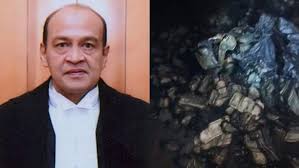Justice Varma cash row: ‘Half burnt notes highly suspicious,’ says panel, underlines ‘implied responsibility’, ‘misconduct’

New Delhi, June 19, 2025 — The controversy around retired Justice Rajeev Varma has intensified. A court-appointed panel said the discovery of half-burnt cash notes at his Lucknow home is “highly suspicious.” The panel also flagged misconduct and implied responsibility, urging further investigation by central agencies.
Police found the currency stash in May during a raid. Officials discovered both burnt and intact bundles of ₹500 and ₹2000 notes hidden in a false wall compartment.
🔍 Panel Raises Red Flags Over Possible Cover-Up
The panel’s 47-page report points to a deliberate attempt to destroy evidence. The half-burnt notes appeared freshly damaged, with some still warm when discovered.
“This kind of partial burning suggests an attempt to hide or destroy illegal currency,” the report stated.
“The method used was too calculated to be accidental.”
Justice Anita Dey, a retired judge, led the inquiry. The panel included two other senior legal experts, who reviewed forensic details and statements from the former judge’s household staff.
🧾 Ownership and Responsibility
Justice Varma denied knowing about the hidden cash. He claimed he had not lived in the house for months. However, the panel emphasized that he still owns the property and is responsible for what’s inside.
“Legal ownership brings an element of implied responsibility,” the report noted.
“The concealment cannot be dismissed as coincidental.”
While the panel did not directly accuse Varma of wrongdoing, it stressed the need for deeper inquiry.
🛠️ Doubts Over Renovation Claim
Justice Varma told investigators the house was under renovation. He said construction workers and caretakers had access to the property, implying the cash could have been planted.
However, the panel found no evidence of major repairs. Contractor logs and CCTV footage suggested only minor work took place.
Neighbors also reported no construction activity. The panel concluded that the renovation claim does not explain the presence of hidden cash.
⚖️ Concern Over Judicial Integrity
This case has raised questions about the conduct of retired judges. Many legal experts worry that such incidents damage public trust in the judiciary.
Senior lawyer Vrinda Kamath said,
“Even after retirement, judges must uphold ethical standards. Incidents like this break the trust people have in the system.”
The panel did not accuse Justice Varma of corruption. However, it said the circumstances point to a lapse in judgment and ethics.
🔎 Push for Central Investigation
The panel strongly recommended an investigation by central agencies like the CBI or Enforcement Directorate. They believe a national-level probe is necessary to determine the source of the cash and possible financial crimes.
Sources in the Law Ministry said discussions are ongoing. A decision about handing the case to the CBI could come soon.
Officials are also looking into the serial numbers on the currency notes. Early signs suggest that the bundles may have come from bulk withdrawals.
📣 Public Outrage and Legal Debate
The Justice Varma cash row has triggered a strong response online. Hashtags like #CashWithJudge and #JusticeOrScandal are trending.
Citizens are demanding stricter oversight of judges even after retirement. Many feel the judiciary must take bold steps to preserve its credibility.
Journalist Ananya Tripathi, who covers legal affairs, commented,
“This case could lead to long-overdue reforms. The public won’t accept vague denials anymore.”
📌 What’s Next for Justice Varma?
Justice Varma has not been charged so far. His legal team said he is innocent and willing to cooperate. They claim he has no link to the hidden cash and that the investigation must be fair.
However, pressure is mounting. If central agencies take over, Varma could be questioned further. Investigators may also check for undisclosed assets or suspicious financial dealings.
🧭 Calls for Reform
Legal experts believe this case could trigger reform in post-retirement policies for judges. Some are calling for mandatory financial disclosures and ethical monitoring systems.
Several former judges have supported this idea. They argue that trust in the judiciary depends on continued accountability.
Conclusion
The Justice Varma cash row has shaken confidence in judicial institutions. The discovery of half-burnt notes in a retired judge’s home is not just a legal issue—it’s a blow to public faith.
Though Justice Varma maintains his innocence, the panel’s report has created serious doubt. Whether or not criminal charges follow, this case shows the urgent need for transparency and reform in India’s legal system.






